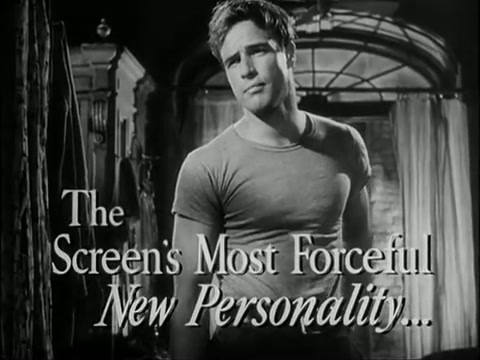Ohjaus:
Elia KazanKuvaus:
Harry Stradling Sr.Sävellys:
Alex NorthNäyttelijät:
Vivien Leigh, Marlon Brando, Kim Hunter, Karl Malden, Rudy Bond, Nick Dennis, Peg Hillias, Wright King, Richard Garrick, Ann Dere, Edna Thomas (lisää)Suoratoistopalvelut (2)
Juonikuvaukset(1)
Based on Tennessee Williams' play, Vivien Leigh stars as Blanche DuBois, a fading Southern belle who's not quite what she pretends to be. All is revealed when she comes to New Orleans to stay with her sister (Kim Hunter) and her volatile husband (Marlon Brando). (jakelijan virallinen teksti)
Videot (1)
Arvostelut (4)
I have an issue with just not liking the way this story is executed, even though the plot itself and its premise are good. It's a story with affected characters, whether in the sense of Blanche or Stanley. But what the film adaptation simply cannot be denied is the acting performances, with Marlon Brando truly dominating outstandingly. It's a wonderful contrast of acting styles, with Brando emerging as the undisputed king. His Oscar snub is simply due to the shamefulness of the Oscar system and the institution as a whole.
()
(SPOILERS ahead) It doesn’t take much: remove it from the time and place, and this story loses any chance of aging. Any new version will lack some of the power of the original. Undoubtedly. The film version is no exception. Together with the Catholic League, the censors felt it necessary to protect viewers untouched by real life against certain “obscenities”. In your free time, you would have to crack the most difficult intelligence-service codes to figure out from the dialogue between Blanche and Mitch that her husband was a homosexual. The rape scene ends without beginning. An important twist is indicated by the broken mirror into which Blanche had previously looked with less and less certainty. This is one of the few moments when Kazan remembers that he is directing a film, not a stage production. With material of such dramatic qualities, it isn’t necessary to come up with intricately composed shots. The characters and their dialogue are the be-all and end-all. Stanley Kowalski, the main star of the evening. A coarse, aggressive male defending his territory, but when he has no other choice, he is able to put on the face of the greatest penitent. That works on Stella. Though the ending, again forced by the censors, comes across differently, there is no doubt that her “definitive” rush upstairs, where the base Stanley dares not to go, will not be definitive. She will come back. Perhaps for sex, perhaps for love. Such that Blanche had never known. When Stella asks her if she has taken the streetcar named Desire, she has the upper hand, but she doesn’t admit what we are ironically told right at the beginning: the next station is the cemetery. Even if A Streetcar Named Desire is not the best adaptation of a Tennessee Williams play, which I can’t judge, it certainly ranks among the best acting textbooks with graphic illustrations. You have the unique opportunity to compare Marlon Brando’s first-class method acting and the theatrical acting of Vivien Leigh, whose grand gestures partially correspond to the performance style of her character, an actress on her own private stage, and partially show us that she is of the old school. Two worlds collided. One of the film’s great assets is the throat-constricting despair, into an even more impermeable version of which everything is headed. The other, which is actually the reason for the intense experience of the first, is the actors. Admiration. 85%
()
The movie adaptation of the American playwright Tennessee Williams' play of the same name, A Streetcar Named Desire, was an extraordinary critical and audience success in its day, and I think it still has something to say to today's audiences. I especially praise the riveting second act and the great performances from the central four, with Marlon Brando literally mesmerizing me. Not only did he do incredibly well, but he also demonstrated his undeniable acting talent. He portrayed the character of Stanley Kowalski, an explosive, rude and uncouth man, so convincingly that it gives you chills. (85%)
()
"A Streetcar Named Desire" is one of Tennessee Williams' most famous plays. I've seen the emergence of young Brando several times and can only tick off the entry from post-war US cinema, for this is not a gem. But if I think more about Vivien Leigh's career, I can happily conclude that she has spent her life acting only to become Blanche DuBois for good, because all her sassy protagonists seem to have followed in the footsteps of this desperate being.
()




Mainos